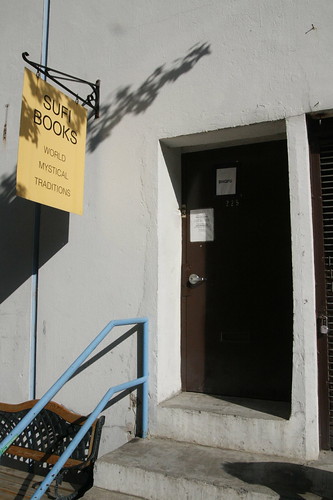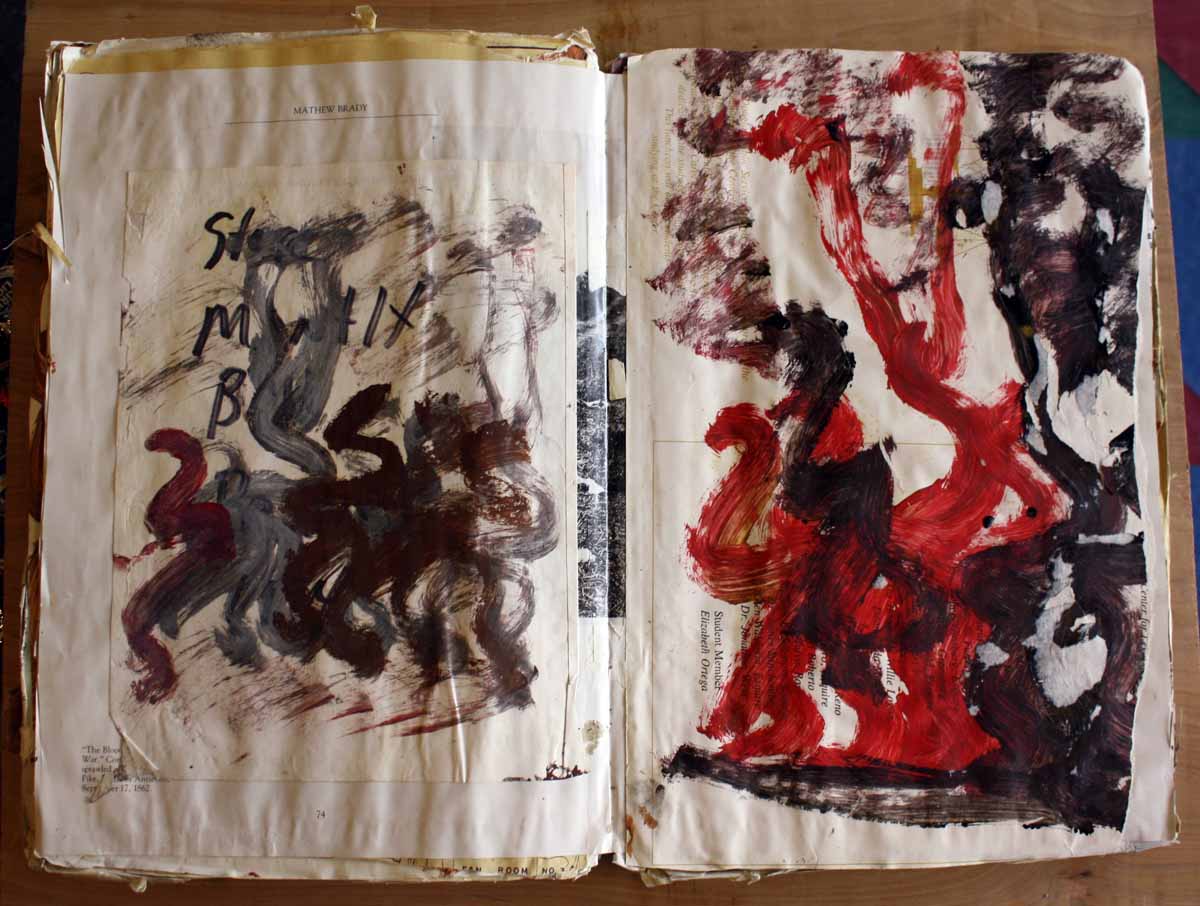Matthew Lusk’s Untitled Hobo at the NADA County Affair
I read an article in the NY Times on Monday, October 12, 2009, entitled “Luring Artists to Lend Life to Empty Storefronts”. At the time, I thought it might inspire an interesting posting, especially considering an opening I had recently attended way downtown (south of Trinity Church) which the article failed to mention. Organized by Ellen Scott’s Smart Spaces, which “presents contemporary art in the windows of vacant storefronts”, the exhibition Regeneration opened October 7th at 88 Greenwich Street and featured window installations by Kim Krans, Hilary Harnischfeger, and Cordy Ryman.
But somehow I lost the impetus for this posting until a series of Facebook “friends” redirected my attention to the NY Times article, the thesis of which is that
as the recession drags on and storefronts across New York remain empty, commercial landlords are turning to an unlikely new class of tenants: artists… On terms that are cut-rate and usually temporary — a few weeks or months — the artist gets a gallery or studio, and the landlord gets a vibrant attraction that may deter crime and draw the next wave of paying tenants.
To those of us on the scene for a while, the idea is hardly new: artists as the battering rams of real estate, pioneering the settlement of marginal neighborhoods, going where rents are cheap, where a lot of studio space can be had for less, creating living lofts and non-profit galleries or collective exhibitions in empty commercial lofts and storefronts. This happened in SoHo in the late 60s-70s, in the East Village in the 80s, in Dumbo and Williamsburg and Greenpoint and Bushwick and Downtown Brooklyn.
The conventional narrative sees artists as the adventurous harbingers of better things, taking advantage of economic downturns to establish ad hoc stores, cafes, project spaces and communities where yuppies dare not tread, reclaiming urban space until the recession ends, the real money moves in, the crime abates, and behold: instant hipster paradise. Occasionally the artists even manage to remain in the neighborhoods they helped create. More often they are pushed out.
The NY Times article touches on several interesting situations. Jed Walentas of Two Trees Management, who has a long history of cooperation with artists in Dumbo, notes that
any sort of activity is better than no activity. As long as it’s short enough and it’s flexible, then there’s no real cost. So the question is who can you find that’s going to make an investment in a space with that level of uncertainty, and often it’s the artist.
Also cited is Anita Durst of Chashama, an organization with many buildings and commercial storefronts in the midtown/Times Square area, who is a long term champion of visual and performing artists, providing space to theaters and temporary exhibitions. She indicates the paradigm of seeking artists to rejuvenate fallow commercial space, which she has facilitated for fifteen years, is now spreading to other landlords.
Manon Slome is part of No Longer Empty a consortium of curators and artists using vacant commercial space, and has mounted temporary exhibitions in locales as diverse as a new hotel off the High Line and a former belt factory in Brooklyn. A project in the vacant Tower Record Store on Lafayette and East Fourth Street is apparently also being contemplated. According to their mission statement, No Longer Empty plans to “utilize multiple vacated storefronts and offices” and is
conceived specifically to encourage an artistic response to our present economic condition and the effect on both the urban landscape and the national psyche. The numerous vacated buildings in New York City provide an opportunity for artists to revitalize these spaces with thoughtful, sustainable art installations.
In interview, Slome indicates:
I obviously hope the economic crisis will be over, but I see it as a great way for the public to interact with art in a different way. And it does provide a great platform for artists because they can do things that are maybe more experimental or larger than they could in a gallery space.
One of more promising upcoming ventures is the New Art Dealers Association (NADA) project in Downtown Brooklyn. The NADA County Affair will be held this Sunday, October 18, 2009 from noon – 7 pm to inaugurate the project. NADA’s mandate is to
transform six consecutive storefronts at 395 Flatbush Avenue Extension in the heart of Downtown Brooklyn into dynamic exhibition spaces, featuring large-scale works and installations by emerging artists. “395/NADA ART IN/VISIBLE SPACES”, a 5-month-long exhibition, will simultaneously provide an exhibition for these ambitious pieces and an accessible art space for the community…
The exhibition spaces will be open beginning of October to the general public on Fridays, Saturdays and Sundays. During this time project hosts will be on hand to provide guidance to visitors. Throughout the week, the exhibition will be lit and visible from the outside.

Kenny Scharf spray painting
Kenny Scharf is a participating artist, and a photo of him executing a wall painting in one of the storefronts was part of the NY Times article and can be seen above. Other participants include Alicia Gibson, Allison Schulnik, Brian Faucette, Caitlin McBride, Christian Maycheck, Daniel Heidkamp, Eric Wendell, Erik Parker, Fabian Marti, Ian Pedigo, Justiin Craun, Justin Samson, Kadar Brock, Liz Markus, Luke Stettner, Mamiko Otsubo, Marco Boggio Sella, Mark Schubert, Matthew Lusk, Matthew Spiegelman, Michael Queenland, Michael Rashkow, Michele O’marah, Mike Diana, Mike Smith, Mike Womack, Nancy de Holl, Olaf Breuning, Pedro Barbeito, Quentin Curry, Rachel Foullon, Rachel Owens, Ruby Stiler and Tom Sanford.

BHQFU
In addition to Smart Spaces, several other recent or ongoing projects that take advantage of fallow commercial space are not cited in the NY Times piece. One, the Bruce High Quality Foundation University, or BHQFU on its collegiate hoodies and T-shirts, commenced this September at 225 West Broadway (corner White) in a former Sufi Center in Tribeca. BHQFU is a free, unaccredited institution of arts education with curriculum and participation still very much in flux, committed to the model of experimental, grassroots pedagogy advanced by Black Mountain College in the 1940s. More on the Bruces in another posting.

BHQFU
Finally, starting this past Spring and continuing through August 2009, a vacant storefront in a recently constructed luxury condo at 211 Elizabeth Street in NoLita hosted a group of artists who converted it into a platform for a succession of low budget, short term projects, installations and performances. Here’s the complete schedule of 211 Art:
Mathieu Copeland, 30 – 31 August
Jen Liu, with Scott Kiernan, 29 August
Jen Liu, with Tyler Coburn, 28 August
Jen Liu, with Maria Chavez, 27 August
Rodney LaTourelle, 27 – 30 August
Susanne Schuricht, 25 – 28 August
Erik Smith, 24 – 27 August
Caecilia Tripp, with Emah Fox, Karyn Geyer, Eiju Kawasaki, Brian Lingrind and Sham el Nessim, 22 August
Yvette Mattern with Christine de Lignières, 20 – 24 August
Ronnie Bass, 14 – 20 August
Bettina Hutschek, 12 August
Brian Block, 11 – 15 August
Lucy Gallun, 6 – 11 August
Stefan Saffer, 3 – 6 August
Adina Popescu, with Michael Portnoy, 29 July – 3 August
Sean Raspet, 29 – 31 July
Emily Mast and Evan Mast, 24 -29 July
Alexis Knowlton, 21 – 24 July
Jason Loebs and Patrick Price, 18 – 21 July
Angel Nevarez and Valerie Tevere, 14 – 18 July
Loretta Fahrenholz, 10 – 14 July
An Te Liu, 9 – 10 July
Maria Chavez, Marcella Faustini and Donna Huanca, 6 – 9 July
Ben Bunch, with Sarrita Hunn, 2 – 6 July
David Levine, 29 June – 2 July
David Baumflek, 25 – 29 June
Rey Akdogan, 21 – 25 June
Karl Lydén and Rebecka Thor, 19 – 21 June
Ethan Hayes-Chute, 17 – 19 June
Gabriel Martinez, 14 -17 June
Shinsuke Aso, 12 – 14 June
Paul Pagk, with Adrian Dannatt and Eric Mitchell, 8 – 12 June
Debo Eilers, 4 – 8 June
Liz Magic Laser, with Robert Graner, 31 May – 4 June
Daniel Feinberg / SEMITES Magazine, 26 – 31 May
Indira Sylvia Belissop, 22 – 26 May
Jeff Perkins and João Simões, with Stefan Tcherepnin, 18 – 22 May
Sophie MacPherson, 15 – 18 May
city inspection interlude, 14 May
Mark Tribe, with André Lasalle and Greg Tate, 10 May – 13 May
Christina Linden, 8 – 10 May
Liz Linden, 3 – 8 May
XLXS, 29 April – 3 May
Scale Free Network, 25 – 29 April
B. Wurtz, 23 – 26 April
Alex Singh, 20 – 23 April
Amy Patton, 19 – 20 April
Patricia Reed, 18 – 19 April
Debra Warner, 16 – 18 April
Eve K. Tremblay, 14 April – 31 August
bathroom extension interlude, 8 – 14 April
Scott Kiernan, 4 – 8 April
Trong Gia Nguyen, 31 March – 4 April
Olivier Babin, 28 – 31 March
Filip Gilissen, 24 – 28 March
Boshko Bošković and Ana Prvački, 21 – 24 March
Klara Hobza, 18 – 21 March
Diana Artus, 15 – 18 March
Georgia Sagri, 15 March
Hilario Isola and Matteo Norzi, 13 – 15 March
Georgia Sagri, 13 March
Ania Diakoff, 12 March – 27 August
The Second Hand, 10 – 12 March
Jon Cuyson, 8 – 10 March
conception phase, through 8 March
Finding and using vacant commercial space has been a strategy for many generations of New York artists. That it is now featured in the pages of the NY Times is one more instance of the expected neo-recession zeitgeist fomenting coverage in the mainstream media.



![Reblog this post [with Zemanta]](http://img.zemanta.com/reblog_e.png?x-id=ae070a8c-f240-49b7-a541-a1a693690964)